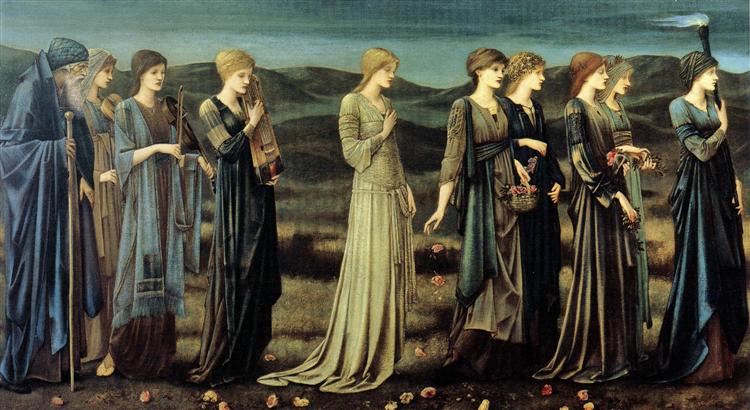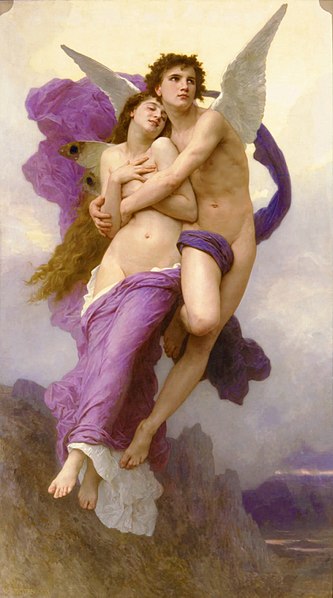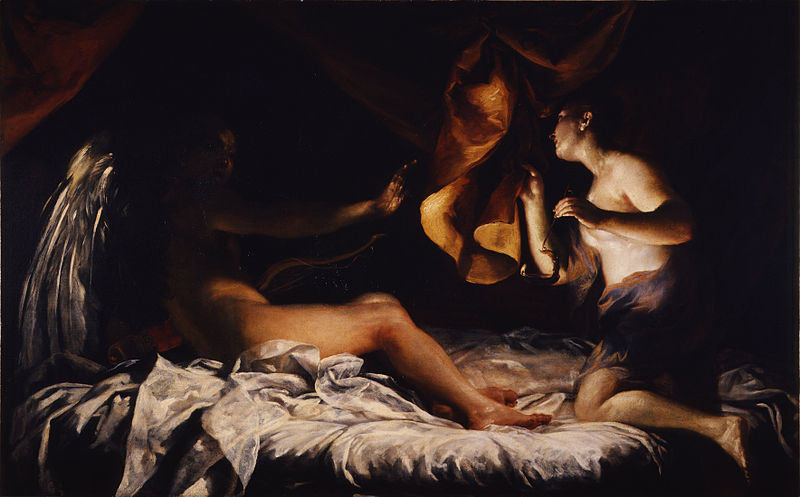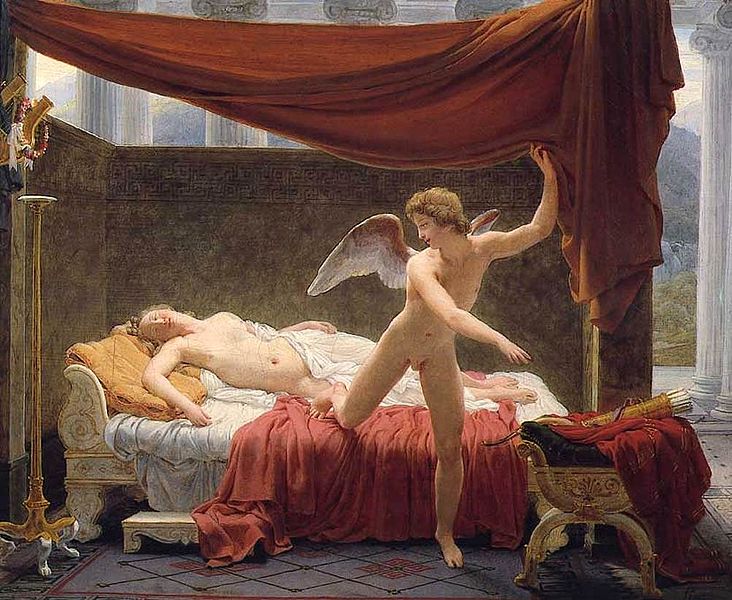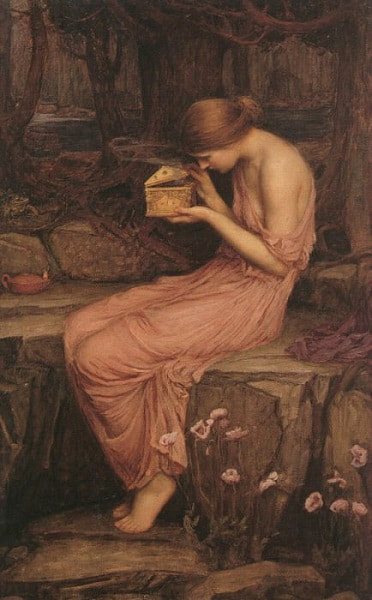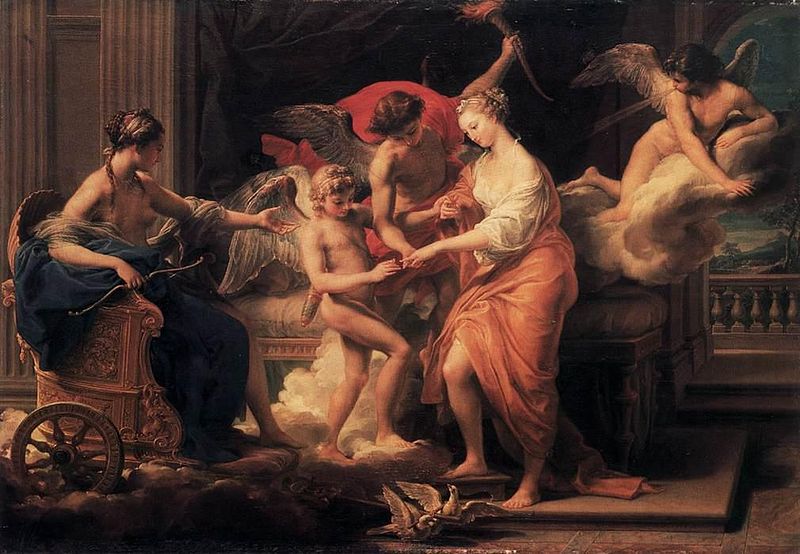PSYCHE GREEK MYTHOLOGY
The word Psyche and its derivatives are common features in the English language, but Psyche was also present in Ancient Greece for it is the name given to the Greek goddess of the Soul. Psyche though was a relatively unusual goddess in the Greek pantheon, for Psyche was not born immortal but was transformed into one.
The Princess Psyche
Today, the most famous version of the mythology of Psyche comes from the Roman period, for the story of Psyche, and Cupid, is a central theme in Apuleius’ The Golden Ass.
Thus Psyche was said to be the youngest of three daughters born to unnamed Greek king and queen. Whilst all three daughters were extremely beautiful, the beauty of Psyche surpassed that of her sisters, and indeed the beauty of any other mortal of the day.
Psyche’s beauty though was as much a curse as it was a boon, for whilst her sisters were happily married to other Greek kings, men observed Psyche’s beauty and were unwilling to approach. As time went by, people even began to worship the beautiful Psyche as if she was a goddess, and as a result the worship of Aphrodite (Venus) was neglected.
Thus Psyche was said to be the youngest of three daughters born to unnamed Greek king and queen. Whilst all three daughters were extremely beautiful, the beauty of Psyche surpassed that of her sisters, and indeed the beauty of any other mortal of the day.
Psyche’s beauty though was as much a curse as it was a boon, for whilst her sisters were happily married to other Greek kings, men observed Psyche’s beauty and were unwilling to approach. As time went by, people even began to worship the beautiful Psyche as if she was a goddess, and as a result the worship of Aphrodite (Venus) was neglected.
The Curse of Aphrodite
|
It was never a good idea to anger a Greek deity, and when her worship was neglected, the ire of Aphrodite rose, and Psyche became the target for this anger, although the princess had of course done nothing wrong.
Aphrodite decreed that Psyche would now fall in love with the most unworthy and ugly of mortal men, and it was given over to Eros (Cupid), Aphrodite’s son to arrange this with his golden arrows. |
|
Whilst Aphrodite was plotting, so Psyche’s father was also trying to plan for the future, and the king consulted one of Apollo’s Oracles to find out what the future of Psyche was to be. The proclamation given by the Sibyl though, did nothing to comfort Psyche’s father, for, as if confirming Aphrodite’s plan, it was said that Psyche was to marry a monster.
The Abduction of Psyche
|
With the proclamation give, Psyche now had to plan the wedding ceremony, although he had no idea who the groom was to be. Thus, on the given day, the bridal party ascended to the top of a mountain to await the groom.
No groom would appear though, but instead the bride to be was abducted from the mountain top, for Psyche was taken up by Zephyrus, the Greek god of the West Wind, and flown far away, before Zephyrus deposited Psyche gently inside a magnificent palace. Zephyrus though had not abducted Psyche for himself, although it was perfectly in keeping with the nature of the god, but instead Zephyrus was working at the behest of Eros. Eros had set out to do the bidding of Aphrodite, but when he observed the beautiful Psyche, all thoughts of punishing her had disappeared for the god of Love had himself fallen in love. |
Eros was in quandary though, for having gone against Aphrodite’ instruction he could not let evidence of this insubordination reach the goddess. Thus Psyche was hidden away in the palace away from prying eyes, but Eros also could not reveal who he was to Psyche, thus Eros only came to Psyche at night, when the princess could not see who her lover was.
Eros warned Psyche that she could not look upon him, for the result would be the ruin of them both.
Eros warned Psyche that she could not look upon him, for the result would be the ruin of them both.
Psyche Takes A Chance
|
In the palace Psyche wanted for nothing, but soon Psyche became lonely separated as she was from her family and the company of others. Eros thus arranged for Psyche’s two daughters to come to the palace, and thus Zephyrus transported them to the palace.
Quickly though the sisters of Psyche became jealous of their sister, for the palace she was living in was superior to any mortal palace. The jealously of the sisters soon manifested itself with them hinting that the unknown lover of Psyche must be a hideous monster, too afraid to show his face, just as the Oracle had previously prophesised. Psyche completely forgot the warning given by Eros, and instead guided by the words of her sisters hatched a plan to reveal the identity of her lover. Keeping a lamp covered in her bedroom, Psyche waited until her lover had fallen asleep alongside her, then carefully she uncovered the light of the lamp. Psyche was somewhat startled to find that her lover was not the expected but a beautiful god. As Psyche looked upon Eros though, so some of the lamp oil leaked from the lamp, awakening Eros as it fell upon him. Eros immediately fled from the bed chamber and palace, angry that Psyche had not trusted him, but also scared as to the consequence that might unfold from his discovery. |
|
The Death of Psyche's SIsters
Having lost Eros, Psyche returned home, but when she told her sisters about the identity of her lover, they became even more jealous, but the pair’s jealousy would ultimately lead to their death. Both of Psyche’s sister attempted to replace their sister as the source of Eros’ love, and both leaped from the peak of a mountain, calling upon Zephyrus to take them to Eros, just as the wind god had done for Psyche. Zephyrus though ignored the calls of Psyche’s sisters, and so both plummeted to their deaths.
Psyche's Search
Psyche started searching for her lost love, wandering across the known lands, but of course Eros was not on earth, but was within Aphrodite’s palace, with Eros having been taken ill, fearing that he has lost Psyche for ever. The illness of Eros had a devastating effect on the world, for without the intervention of Eros, no one was falling in love, and ultimately this even had an impact upon the gods.
Aphrodite though initially had no inclination about why her son was ill nor how he could be made well again, although eventually understanding came upon Aphrodite when Psyche herself turned up at Aphrodite’s palace.
Aphrodite though initially had no inclination about why her son was ill nor how he could be made well again, although eventually understanding came upon Aphrodite when Psyche herself turned up at Aphrodite’s palace.
The Labours of Psyche
|
Understanding though only made Aphrodite angry, for Eros had disobeyed her instructions, and rather than reunite the pair of lovers, Aphrodite decided to punish Psyche.
Task after task was given to Psyche, with the princess kept as a virtual slave in the palace, unaware that Eros was in another of the palace’s bed chambers. Psyche would pray to both Demeter and Hera, and whilst the goddesses heard her prayers, they felt unable to interfere against the actions of another Olympian goddess. The tasks given to Psyche by Aphrodite were initially simply tasks though impossible for a mortal to complete; with one task being to separate a mixed heap of barley grain and wheat into unmixed piles by dawn. Psyche though found help in the form of dozens of ants, who came and separate the heap for her. When Aphrodite found her impossible tasks completed, the goddess decided to allocate deadly tasks instead. First was the task of collecting wool from sheep belong to Helios. These sheep were to be found on far bank of a dangerous river, and the sheep themselves were violent towards strangers; so Aphrodite assumed that either Psyche would drown in the river, or else be killed by the sheep. Instead though a magical reed offers guidance to Psyche, and tells her to simply collect the golden wool that has collected in the thorny bushes along the river bank. |
|
Aphrodite’s anger continues to grow with each completed task, and so Aphrodite sends Psyche to collect water from the River Styx. Despair at the hopelessness of the task begins to overwhelm Psyche, but then Zeus himself intervenes, and sends one of his eagles to collect water for the princess.
Eros to the Rescue
|
One final task is then given to Psyche, one in which Psyche is commanded to bring back a bit of Persephone’s beauty from the Underworld.
In Greek mythology no living soul is meant to be able to enter the Underworld, let alone leave it, and so Aphrodite felt that she would be rid of Psyche once and for all. Indeed, it seemed that Aphrodite would be proved right, for Psyche’s only idea about entering the Underworld was to kill herself. Before Psyche can commit suicide a voice whispers to her instructions about how to complete the task. Thus Psyche finds an entrance to the Underworld and is soon crossing the Acheron upon the skiff of Charon, and the princess even manages to gain an audience with Persephone. Persephone on the surface appears to be sympathetic to the quest of Psyche, but Psyche has been warned about accepting food or a seat in the palace of Hades, for both would bind her to the Underworld for all time. But eventually, Persephone gives Psyche a golden box, said to contain some of the goddess’ beauty. |
The curiosity of mortals would overtake Psyche, and the princess decides to have a look inside the box. Inside though is not beauty, but instead is everlasting slumber, and as Psyche breathes in, so she immediately falls into a deep sleep.
Unbeknownst to Psyche, Eros has been helping her with her tasks from his sick bed, without Aphrodite realising, and now well enough to leave the palace, Eros comes to his lover’s rescue, and reawakens her.
Unbeknownst to Psyche, Eros has been helping her with her tasks from his sick bed, without Aphrodite realising, and now well enough to leave the palace, Eros comes to his lover’s rescue, and reawakens her.
The Goddess Psyche
Realising that Aphrodite’s persecution of Psyche is likely to be unending, Eros goes to Zeus and begs for his help. Eros had previously caused Zeus many problems but taken with Psyche’s plight, and also the potential for Eros to be less disruptive if he is settled down and married, and also helpful in Zeus’ future love life, Zeus makes a proclamation that Psyche and Eros are to be wed.
As a result Psyche is made immortal by Zeus, and made the Goddess of the Soul.
Aphrodite was not best pleased with the turn of events, but she had no allies amongst the other Olympian gods to go against the decree of Zeus in this case, and eventually Aphrodite is appeased. The wedding feast that follows is on a par with any of the banquets that had gone before, with Apollo playing his lyre, Pan on his syrinx, and the Muses entertaining.
The joining of Love and Soul, in the form of Eros and Psyche, would bring forth one child, Hedione (Volupta), the goddess of pleasure and enjoyment.
As a result Psyche is made immortal by Zeus, and made the Goddess of the Soul.
Aphrodite was not best pleased with the turn of events, but she had no allies amongst the other Olympian gods to go against the decree of Zeus in this case, and eventually Aphrodite is appeased. The wedding feast that follows is on a par with any of the banquets that had gone before, with Apollo playing his lyre, Pan on his syrinx, and the Muses entertaining.
The joining of Love and Soul, in the form of Eros and Psyche, would bring forth one child, Hedione (Volupta), the goddess of pleasure and enjoyment.
|
|
